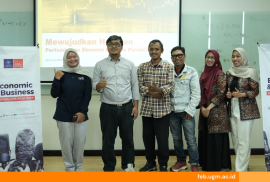Thursday (13/7), entering the 12th lecture of Global Summer Week (GSW) 2023, the Faculty of Economics and Business Universitas Gadjah Mada (FEB UGM) presented Prof. Dr. Syed Abdul Hamid Aljunid lectures in Ethics and Governance at The International Center for Education in Islamic Finance (INCEIF) University. Prof Syed discussed the importance of promoting ethics and governance in private companies, including Micro, Small, and Medium Enterprises (MSMEs), as well as the related challenges. In this discourse, one of the questions discussed is whether ethical discourse should be the same between companies listed on the stock exchange and MSMEs. In addition, can ethical theories be applied in the same way when understanding ethics in SMEs?
Prof. Syed then continued that another challenge is understanding ethics and responsibility in a socio-political context that involves corruption and an overemphasis on exchange values in business. He then detailed that in the context of companies that are not registered (not yet IPO), including MSMEs, there are several problems and challenges related to ethics and governance. Awareness and expectations regarding ethics and corporate governance are often poorly understood. Many companies think that avoiding punishment is sufficient to satisfy demands for ethical behavior. In addition, challenges companies must face include vulnerability to corruption, pressure to be economically efficient and ethical simultaneously, lack of resources and training to apply good practices in ethics and governance, and lack of reporting policies and procedures.
According to Prof. Syed, the government must take the initiative to encourage companies to adopt best practices in ethics and governance. Several steps that can be taken include conducting background checks for individuals who will become directors, training covering aspects of company law, corporate governance, ethics, and sustainability, as well as providing incentives to companies that have certified directors. In addition, the government can provide training and consultancy on ethics and governance and encourage efficient and transparent procurement practices of goods and services in the public sector.
In conclusion, Prof. Syed explained that in order to achieve ethics and good governance, companies must understand their responsibility in developing corporate integrity, create appropriate frameworks, and track the effectiveness of these frameworks. The directors’ strategies and policies must pay attention to management to deal with a volatile market environment, including climate risks, disruptions in supply chains, increasing global and social polarization, socioeconomic imbalances, and the impact of technological changes on ethics and values themselves, he added. This lecture ended with a discussion and question and answer session on ethics and governance, to which GSW 2023 participants enthusiastically contributed.
Reportage: Hayfaza Nayottama




